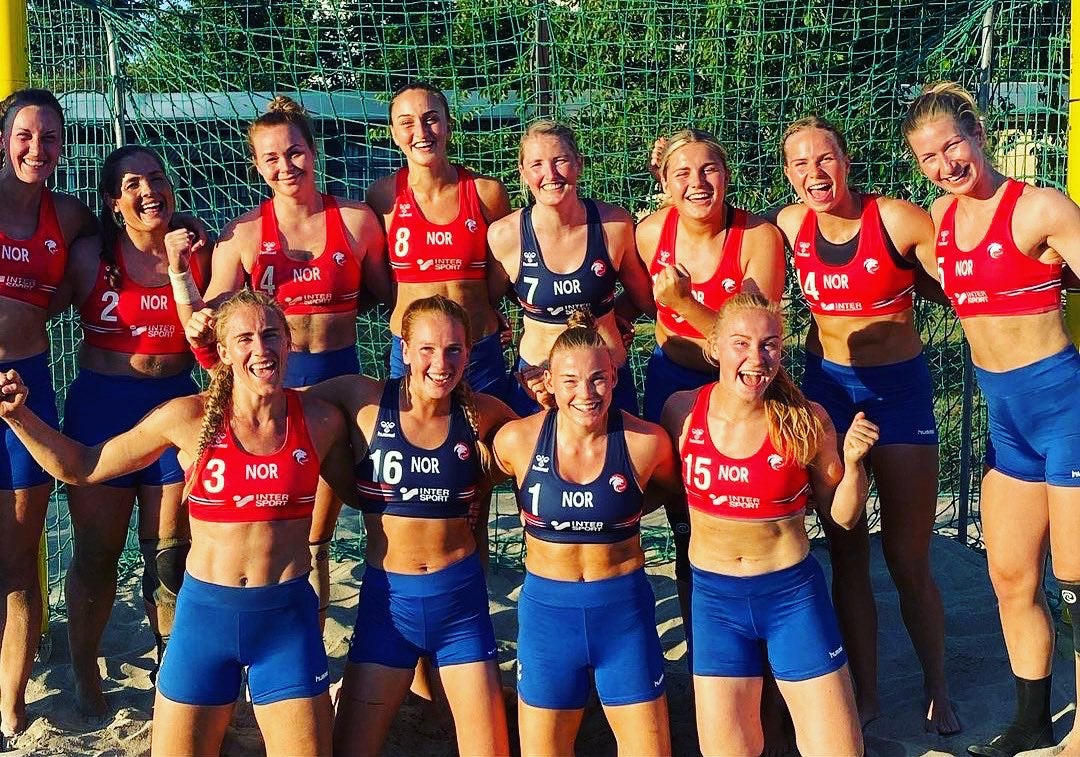The Independent's journalism is supported by our readers. When you purchase through links on our site, we may earn commission.
The white women of the Norwegian handball team are finding out what hijabi women knew all along
It’s a travesty that these sportswomen were fined for refusing to wear small bikini bottoms — and it’s rare that the people campaigning for more modest attire look this way


Another day, another group of men deciding how women should cover their bodies. Except this time, the victims in the spotlight are white women from Norway. The oppressors? The International Handball Federation.
Citing “improper clothing”, the Federation’s Disciplinary Commission slapped a fine of 150 euros per member of Norway’s female team at the Beach Handball Euro 2021 championship on Sunday, because they chose to wear shorts instead of the bikini bottoms that are required of players. They were penalized for deciding to add a little bit of length to their uniforms, thereby fully covering their butts and inner thighs — even though male handball players are allowed to wear shorts up to four inches above their knees.
I’m no athlete, but I am a woman who opts for shorts instead of bikini bottoms at the beach, and I’m fairly certain that those extra few inches of coverage in no way impacted this team’s game. The only possible effect it could have had was on spectators’ views of the female players’ bodies, so the fact that the Federation decided to fine the Norwegian team reflects a deeply problematic spirit of sexism. As my mother remarked upon hearing the news, “That’s just sleazy”.
The Norwegian women’s handball team merely took the parameters of their bodily coverage into their own hands, unsatisfied with participating in a competitive, publicized sport with their bottom halves exposed in garments resembling their underwear. The Federation’s exact rules for women’s uniform bottoms state they should have “a close fit and [be] cut on an upward angle toward the top of the leg.”
Appearing on British breakfast program Lorraine earlier today, two team members stated that there was “no good reason” why they should be forced to wear bikini bottoms. “If the guys can do the sport in a T-shirt and shorts, then we should be able to do the exact same sport in the exact same outfit,” said Norway’s Tonya Lurstaad, adding that the rules deter women with body insecurities from participating.
The glaring hypocrisy and double standards brought to light by this incident are impossible to ignore, but it’s important to recognize where they are rooted: They exist due to the fact that it’s primarily men who are the policymakers behind these sporting institutions. The situation is similar in the fashion industry, which has traditionally been dominated by male creative directors, designers and photographers, who create and promote clothing pandering to “the male gaze” — that is, what men want to see on the runways, on the streets, in their bedrooms and, evidently, on the beachside handball court.
The modest fashion movement that has made headway over the past decade, cementing itself as a multi-billion-dollar industry attracting women of diverse backgrounds, is testament to the fact that there is a very large number of women who prefer concealing their skin instead of revealing it, whether it’s because of their religion, culture or simply the comfort that more conservative cuts can provide. Many modest fashion enthusiasts claim that covering up can be empowering and feminist, as it rejects societal ideals that measure a woman by the amount of skin that she shows. In rebelling against the rules and trading in their bikini bottoms for less skimpy shorts, the statement made by Norway’s female handball team was equally empowering and feminist.
While it’s a travesty that these women were fined for wanting to wear attire that was a little more “decent”, I’m glad that this happened, that the news is making headlines across the globe, and that the featured image in these stories is of a group of smiling white women in sports bras and shorts. Too often are dark-skinned, veiled, Muslim women the “poster girls” for modesty, relegating issues of body autonomy, inclusivity, headscarves and modest fashion to marginalized minority groups that are “othered” and fail to elicit empathy from the wider population.
Muslim modesty-conscious athletes, after all, have already paved the way for reform when it comes to sporting uniform regulations. American collegiate basketball player Bilqis Abdul-Qaadir, who became the first hijabi woman to play NCAA Division 1 basketball, was unable to play professionally in Europe after graduating due to the International Basketball Federation (FIBA) rule that forbids headwear larger than five inches. She petitioned for an exemption, and it took more than three years for FIBA to revise their headwear rule. By that time, she was considered too old to play professionally.
In the wake of the backlash they’ve received, The European Handball Federation (EHF), is already in damage control mode. “I can confirm that the EHF will do all it can to ensure that a change of athlete uniform regulations can be implemented,” said its president, Michael Wiederer, earlier today.
Abdul-Qaadir waited more than three years for reform. For Norway’s handball team, I predict three months, tops.
Hafsa Lodi is the author of ‘Modesty: A Fashion Paradox: Uncovering the causes, controversies and key players behind the global trend to conceal rather than reveal’

Join our commenting forum
Join thought-provoking conversations, follow other Independent readers and see their replies